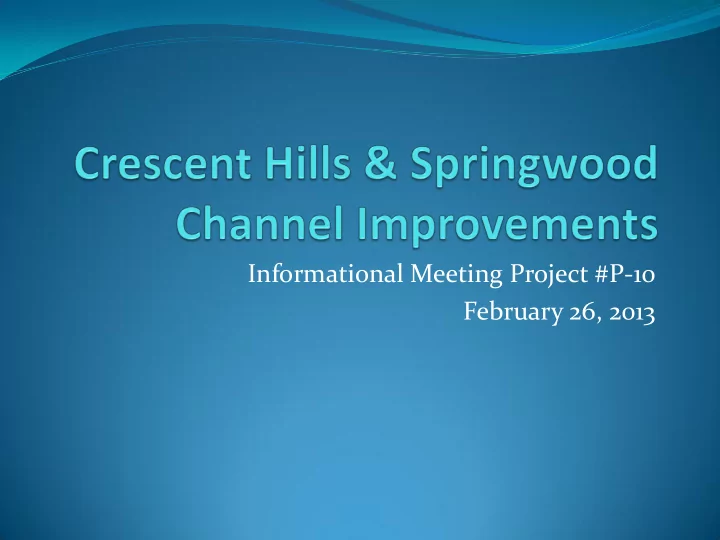

Informational Meeting Project #P-10 February 26, 2013
Agenda Welcome & Introductions Storm Water Master Plan Overview Conceptual Overview of Improvement Project Examples of Channel Improvements Letter of Intent Schedule Update Resident Contact Information
Storm Water Master Plan Overview MS4 Stormwater Permit 2011 Storm Water Master Plan 47-miles of Stream Assessment 250 Basins Hydrologic and Hydraulic Modeling Flooding, Stream Stability & Habitat, Water Quality Storm Water Code and Ordinance Review Capital Improvement Projects Over 100 projects at a cost of $125,000,000
CIP Project Distribution $0 < 75 Projects < $ 2 Million ($20 Million) $2 Million < 11 Projects < $ 4 Million ($32 Million) $10 Million < 5 Projects < $15 Million ($66 Million)
Funding 2008: City Voters authorized the City to issue up to $ 40 million for Storm Water Bonds Aug 2012: Voters passed Proposition P 0.4% Sales Tax Increase Generate $4.8 million annually for Parks & Storm Water Nov 2012: City sold first $ 4 million in bonds Sales Tax started January 1, 2013
Current Project Status TEN project areas to begin design phase Initial meetings with trustees and residents from 10 subdivisions already completed Consultants selected and Design Contracts approved 18 detention basin retrofits & 3 channel projects FOUR projects currently in design consultant selection phase Currently meeting with trustees and residents 4 detention basin retrofits & 4 channel projects
Partnership SWMP outlines projects & conceptual improvements Prop P provides funding to design & construct City cannot spend public $ on private property Property owner donates necessary easements City can fund design, construction & maintenance
Crescent Hills & Springwood Channel Improvements, P-10
Conceptual Project Overview Overall Goals and Benefits Watershed based improvement Stabilize mass wasting, inlet erosion, eroding banks Vertical grade controls Provide diverse and productive ecosystem City will maintain improvements Relieves HOAs and property owners from financial burden
Conceptual Project Overview Stabilize channel bottom with grade controls Stabilize eroding banks at specific locations and reaches throughout the project limits Renovate or Improve the riparian corridor
Conceptual Channel Improvements Upstream portion of channel (11 Whitewood to upstream project limit) • Grade controls to stabilize bed • Improve riparian corridor • Bank stabilization to stop active • Remove invasive plants erosion Downstream portion of channel (11 Whitewood down to McClay basin) • A more stable portion of channel, limited stabilization measures • Better riparian corridor, create more diversity • Attention to Sanitary sewer crossing
Example Channel Improvements
Example Channel Improvements
Example Channel Improvements
Example Project, SC-4 January 2006 Pre-construction April 2009 December 2005
Example Project, CD-1 November 2007 Pre-construction July 2008
Example Project, MC-1 Preconstruction January 2007 April 2007 July 2010
Easements • Much of the channel is on private property • At this time, easement limits are conceptual • Easements are necessary, and may include • Temporary Construction Easements • Permanent Drainage Easements • Permanent Access Easements
Crescent Hills & Springwood Channel Improvements, P-10
Maintenance and Stewardship Property Owner will retain ownership of land City and Property Owner will define the easement areas for designed improvements. City will maintain channel improvements within easement Property Owner will retain maintenance of property outside of improvement and easement area
Letter of Intent (LOI) Allows City to proceed to spend Public Funds for Design Services LOI states: Acknowledge and agree to support the proposed channel improvement project Intend to donate the necessary easements when more detailed information can be provided after a preliminary design has been completed Understand if the project does not have support from all affected property owners, this project may not move forward and improvements may not be made along the entire project reach.
Signed Letter of Intent (LOI) Design contract can be awarded Project start-up meeting w/City, design team & property owners 30% preliminary plans designed & presented 30% design plans provide more detail and better easement limits After review of 30% design, easement documents can be prepared with certainty on final limits
Channel Improvements along Private Property – Flow Chart Home Owner signs LOI 30% Design Review Meeting w/ Home Owner Home Owner signs Easement Documents Finish Design & Construct
Schedule February: Reviewing Design Firms’ Qualifications March 11 : Property Owners submit signed LOI to City March: City Negotiates Design Contracts March 28: Submit contracts for BOA approval April: Project start-up meeting Apr-Sept: Design May-June: 30% Design Presentation & Discussion Jul-Sept: Easement Acquisition Nov: Bid Construction Jan 2014: Submit Construction Bids for BOA Approval Spring 2014: Start Construction
Recommend
More recommend